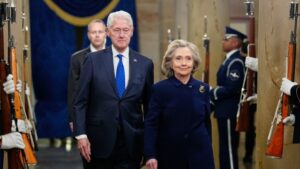The Trump White House isn’t known as a hot spot for Ivy League intellectuals. But last month, a Harvard academic slipped into the White House complex for an unusual meeting. Graham Allison, an avuncular foreign policy thinker who served under Reagan and Clinton, was paying a visit to the National Security Council, where he briefed a group of staffers on one of history’s most studied conflicts—a brutal war waged nearly 2,500 years ago, one whose lessons still resonate, even in the administration of a president who doesn’t like to read.
The subject was America’s rivalry with China, cast through the lens of ancient Greece. The 77-year-old Allison is the author of a recent book based on the writings of Thucydides, the ancient historian famous for his epic chronicle of the Peloponnesian War between the Greek states of Athens and Sparta. Allison cites the Greek scholar’s summation of why the two powers fought: “What made war inevitable was the growth of Athenian power and the fear which this caused in Sparta.” He warns that the same dynamic could drive this century’s rising empire, China, and the United States into a war neither wants. Allison calls this the “Thucydides Trap,” and it’s a question haunting some very important people in the Trump administration, particularly as Chinese officials arrive Wednesday for “diplomatic and security dialogue” talks between Washington and Beijing designed, in large part, to avoid conflict between the world’s two strongest nations.
It might seem curious that an ancient Greek would cast a shadow over a meeting between a group of diplomats and generals from America and Asia. Most Americans probably don’t know Thucydides from Mephistopheles. But the Greek writer is a kind of demigod to international relations theorists and military historians, revered for his elegant chronicle of one of history’s most consequential wars, and his timeless insights into the nature of politics and warfare. The Yale University historian Donald Kagan calls Thucydides’ account “a source of wisdom about the behavior of human beings under the enormous pressures imposed by war, plague, and civil strife.”
Thucydides is especially beloved by the two most influential figures on Trump’s foreign policy team. National security adviser H.R. McMaster has called Thucydides’ work an “essential” military text, taught it to students and quoted from it in speeches and op-eds. Defense Secretary James Mattis is also fluent in Thucydides’ work: “If you say to him, ‘OK, how about the Melian Dialogue?’ he could tell you exactly what it is,” Allison says—referring to one particularly famous passage. When former Defense Secretary William Cohen introduced him at his confirmation hearing, Cohen said Mattis was likely the only person present “who can hear the words ‘Thucydides Trap’ and not have to go to Wikipedia to find out what it means.”
That’s not true in the Trump White House, where another Peloponnesian War aficionado can be found in the office of chief strategist Steve Bannon. A history buff fascinated with grand conflict, Bannon once even used “Sparta”—one of the most militarized societies history has known—as a computer password. (“He talked a lot about Sparta,” his former Hollywood writing partner, Julia Jones, told The Daily Beast. An unnamed former colleague recalled for the New Yorker Bannon’s “long diatribes” about the Peloponnesian War.)
In an August 2016 article for his former employer, Breitbart News, Bannon likened the conservative media rivalry between Breitbart and Fox News to the Peloponnesian War, casting Breitbart as the disciplined warrior state of Sparta challenging a decadently Athenian Fox. There’s also NSC spokesman Michael Anton, a student of the classics who owns two copies of Thucydides’ fabled work. (“The acid test for me is: Do you read the Hobbes translation?” he says. “If you’ve read that translation, you’ve got my respect.”)
Ask me anything
Explore related questions





